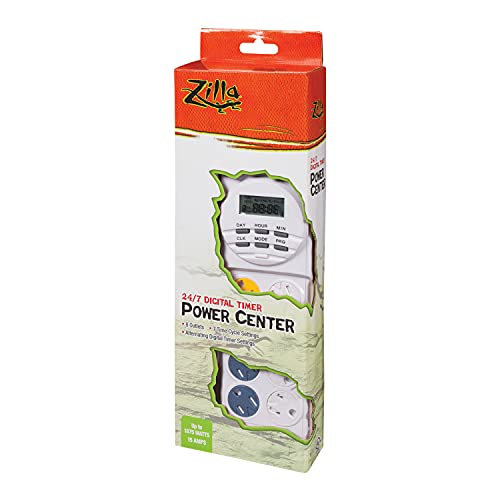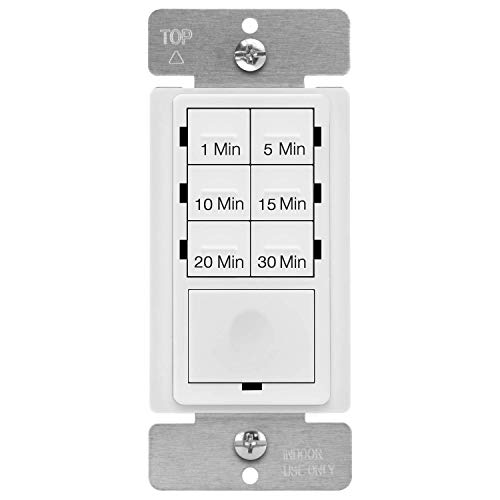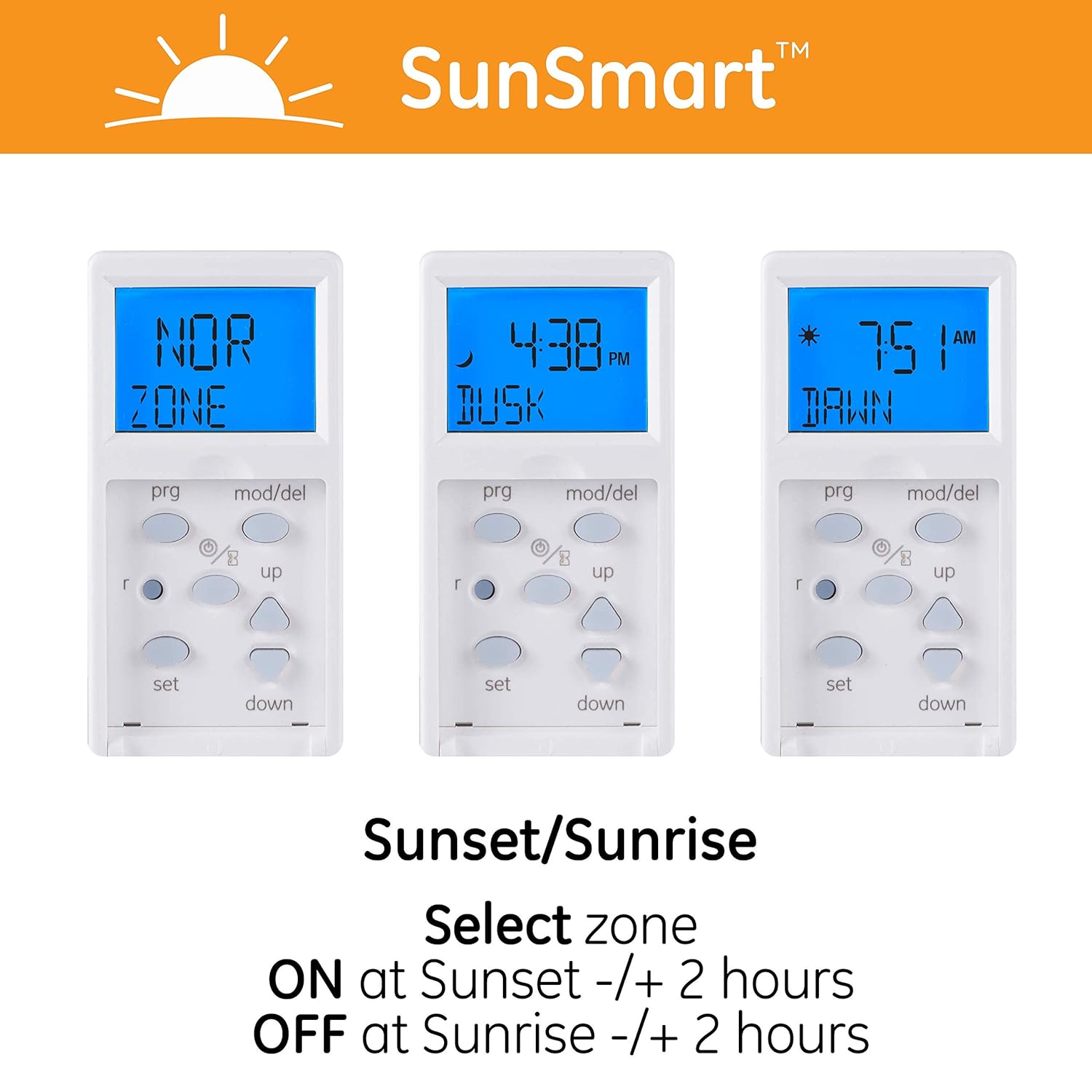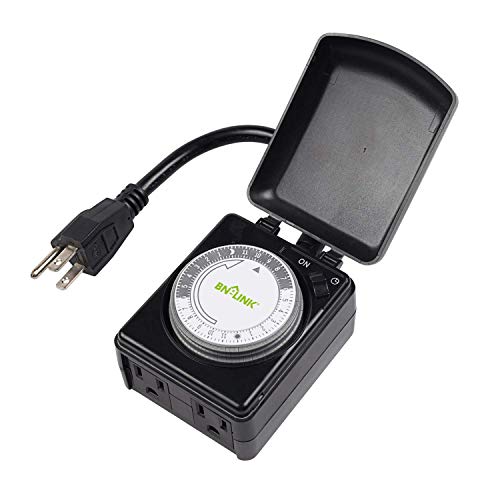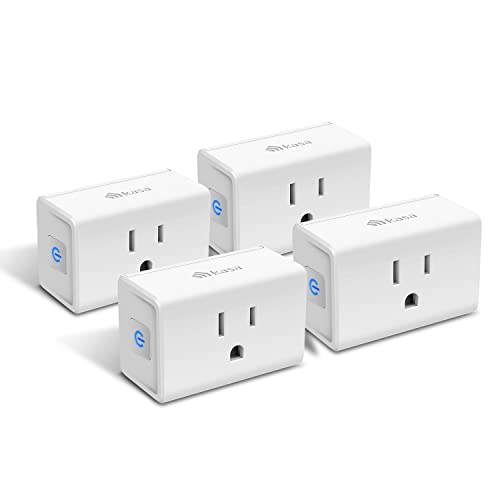The Best Light Timers for Seamless Control, Top Picks & Reviews
Mike William, Ahmed Williams Feb 26, 2026 8:38 PM
When it comes to controlling home lighting efficiently, investing in the best light timers is crucial. Automatic light timers offer convenience and security, allowing you to program your home's lighting schedule effortlessly. Programmable light switches and smart light timer devices provide advanced features for tailored illumination settings.
Our Top Picks
Source: Amazon
Best Scheduling: Honeywell Home RPLS740B ECONOswitch 7-Day Solar Programmable Switch
The ECONOswitch 7-Day Solar Programmable Switch offers customizable 7-day programming for lights and motor-operated appliances, helping save energy and streamline home automation. It supports multiple lighting types including LED, CFL, incandescent, halogen, and fluorescent, and can handle up to 1800W or ¾ HP on 120V. Installation is straightforward, and the switch allows both manual and automatic control with a simple 3-button interface.
Pros:
-
Energy Saving
-
Multi-Device Control
-
Easy Programming
-
Versatile Compatibility
Cons:
-
Single Switch Limitation
-
Requires Power Cut for Installation
From a customer perspective, the ECONOswitch is practical for those looking to automate lighting and small appliances efficiently. Its programmable schedules are convenient and reduce energy costs, though homes needing multiple switches may require additional units. The installation is manageable for most users but demands careful handling of circuit power.
Best Sunlight: GE SunSmart in-Wall Digital Timer, Daily ON/Off Times
The GE SunSmart Digital In-Wall Timer features SunSmart technology to automatically adjust sunrise and sunset settings, ensuring your lights align with natural daylight throughout the year. It allows up to seven daily ON/OFF programs, supports a random security mode for a lived-in appearance, and works with LED, CFL, incandescent, and halogen bulbs. Designed as a switch upgrade for single-pole or three-way setups with a neutral wire, it also accommodates daylight saving time changes without needing reprogramming.
Pros:
-
Automatic Sun Adjustment
-
Weekly Scheduling
-
Security Mode
-
Wide Bulb Compatibility
Cons:
-
Neutral Wire Required
-
Slightly Complex Setup
From a customer standpoint, this timer is ideal for those seeking automated lighting that adapts to seasonal changes and enhances home security. The SunSmart feature is particularly convenient, while the setup may be more involved for users without electrical experience.
Best Astronomic: TOPGREENER Digital Astronomic Timer Switch
The TOPGREENER Digital Astronomic Timer Switch offers 7-day programmable scheduling with an astronomic feature that automatically adjusts lights from dusk to dawn. It supports single-pole or 3-way installations with a neutral wire and accommodates LED, incandescent, and motor-operated devices. Additional features include a random function for security, manual override, countdown timer, and a back-lit LCD screen for easy programming in low light.
Pros:
-
Astronomic Adjustment
-
Weekly Programming
-
Random Security Mode
-
Manual Override
Cons:
-
Neutral Wire Required
-
Wall Plate Sold Separately
From a customer perspective, this timer is ideal for those wanting precise, automated control of lights and small appliances while enhancing home security. The astronomic feature adds convenience by adjusting to seasonal daylight changes, though installation requires familiarity with neutral wiring.
Best Versatile: myTouchSmart In-Wall Digital Timer, 4 Programmable
The myTouchSmart In-Wall Digital Timer allows scheduling of indoor and outdoor lights and appliances with four programmable on/off buttons and two manual override buttons. Blue LED indicators show active programs, and it supports LED, CFL, incandescent, and dimmable bulbs. Installation replaces an existing switch with screw terminals and requires a neutral wire, while the battery backup preserves settings during power outages.
Pros:
-
Multiple Programmable Buttons
-
Manual Override
-
Battery Backup
-
Broad Bulb Compatibility
Cons:
-
Neutral Wire Required
-
Wall Plate Sold Separately
From a customer perspective, this timer is convenient for homes needing flexible scheduling with easy manual overrides. The battery backup adds reliability during outages, and the LED indicators simplify monitoring active programs, though installation requires handling neutral wiring.
Best Reptile: Zilla Reptile Pet Habitat Lighting & Terrarium Heat Power
The Zilla Reptile Digital Power Center Timer provides full control over habitat lighting and heating with 24/7 programmable schedules. It features eight outlets—four alternating for day/night cycles and four with constant power—supporting up to 1875 watts. The easy-to-use digital interface with an LCD display allows precise on/off programming for multiple devices through a single power strip.
Pros:
-
Day/Night Outlet Control
-
Multiple Outlets
-
Easy Digital Programming
-
High Wattage Support
Cons:
-
Bulky for Small Spaces
-
Limited to Habitat Use
From a customer perspective, this timer is ideal for reptile owners seeking precise, automated control of lighting and heating. The alternating outlets make it easy to replicate natural day/night cycles, though the unit’s size may be cumbersome in compact setups.
- 9.4
- BrandmyTouchSmart
- Prime
- 9.2
- BrandZilla
- Prime
- 8.6
- BrandENERLITES
- Prime
- 8.4
- BrandDEWENWILS
- Prime
- 8.3
- BrandBN-LINK
- 8.2
- BrandBN-LINK
Last update on 2026-02-26 / Affiliate links / Images, Product Titles, and Product Highlights from Amazon Product Advertising API
In selecting the optimal light timer for your requirements, a number of critical considerations ought to steer your selection process. In this segment, we plunge into the fundamental aspects that guarantee you procure a dependable, user-friendly, and energy-saving light timer that integrates seamlessly with your current arrangement.
Reliability and Durability
The most important aspects of a light timer are that it can be trusted to work properly over time. A reliable timer consistently does what it is meant to do without issues, allowing you to feel confident that your lighting needs will stay on schedule. This is important no matter what may occur like power outages or changes. Look for timers made from strong, long-lasting materials and produced by companies dedicated to quality you can count on. These manufacturers aim to create timers built to last.
User-Friendly Interface and Programming
An easy-to-use interface and customizable functions greatly improve how functional a light timer is. Self-explanatory buttons, clear directions, and straightforward programming choices make establishing the timer simple and allow users with all ranges of technical skill to work the device proficiently. Look for timers with uncomplicated menus, customizable configurations, and potentially even properties like remote management or smartphone combination for extra benefit and adaptability.
Compatibility with Different Light Fixtures
A light timer's usefulness depends on how well it works with different light fixtures. Whether you have incandescent, LED, fluorescent bulbs or another type, choose a timer that easily connects to the fixtures you need to manage. Make certain the timer meets the voltage and wattage needs of your lights to avoid problems and potential harm to the timer or lighting setup. Changing the bulbs or fixtures? Confirm the timer continues functioning properly with any replacements.
Energy Efficiency Features
When choosing a light timer today, considering options with energy-saving elements can lead to substantial financial benefits through decreased usage over the long run. Search for timers outfitted with sophisticated scheduling capabilities, including customizable on/off routines and adjustable illumination intensities, permitting the optimization of power usage aligned with your lighting necessities. Moreover, functionalities like motion detectors or ambient light detectors can further bolster energy efficiency by instinctively regulating lighting levels relying on presence and natural light situations.
Picking the Right Light Timer: Things to Ponder
Proper light control at home makes a comfy space and saves energy. A light timer helps in this. But picking one needs thought, with various types and functions on offer.
1. Timer Type:
Start by picking a light timer type. You can opt for simple plug-ins, timers in walls or smart timers managed from afar. Pick according to your likes and the automation you want.
2. Setting Schedules:
A decent light timer should be flexible in setting schedules. Check the ease of setting different schedules for different days. This tuning of lights suits your way of life, boosts safety and saves energy.
3. Energy Supply:
Consider the energy supply of the light timer. Some timers are battery-driven, and others require a direct plug-in. Select one matching your likes and the power sources you have.
4. Right Fit with Bulbs:
All light timers don't fit with every bulb type. Make sure your choice is compatible with your bulbs. Timers may be designed for LED or CFL bulbs, or they might be best for incandescent bulbs.
5. Setup Simplicity:
Think about how to install it. Plug-in timers are simple. In-wall timers might need more work. With smart timers, you may need to sync them with a phone app. Check if you're okay with this.
6. Extra Traits:
Look at the bonus features of the timer. Some have random switches that act like people for security. Others can change with the light around them.
7. Money Planning:
Decide on a budget for your timer. There are many choices but setting a budget helps you pick the best for your money.
8. Trust-worthy Brand and Feedback:
Check brand reputation. Look at customer reviews. They will tell you how good the timers really are. Good reviews mean the brand is trust-worthy and high quality.
Finding the right light timer requires evaluating your needs and lots of factors, like type, capabilities, power, setup, features, budget, and brand. Evaluating these can help you pick a timer that meets your needs. It can also make your home more efficient and comfy.
Light Timers FAQs
Can light timers cause fires?
Indeed they can. Light timers might cause fires due to their ticking mechanism that can spark. If a spark catches, it can lead to a speedy blaze.
What are the main types of timers?
Timers, frequently used in homes and classrooms, help with timing or countdown tasks. The primary kinds are digital, mechanical, and electronic timers. Digital ones utilize electricity for timing, while mechanical timers rely on a clockwork mechanism. In contrast, electronic ones use radio or light waves and don't need moving parts.
Is it possible to put a timer on a light switch?
Switching lights on and off is a regular chore in any household. However, it can be bothersome when you can't find the switch in the dark, for example. Thankfully, timers exist, saving both your time and energy by automating this task.
Can timers control LED lights?
A timer is a useful device that allows you to control when an appliance or light switches on and off. They are quite versatile and can be found in numerous electronic devices.
Related Posts:
- 10 The Best Outdoor Light Timer Reviews & Buyers Guide for 2026
- Expert’s Choice: 10 The Best Outdoor Timer For Christmas Lights Passed Our Test 2026
- 10 The Best Timers: Reviews – Buyer’s Guide for 2026
- 10 Best Christmas Light Timer as Reviewed by Experts: Top-picks for You
- The Best Over-The-Range Microwave Of 2026
So, the top 10 light timers of 2026 present different choices for different needs. You get simple plug-in timers or smart ones, offering easy use, a handiness, and saving power. Think about what you want, if it matches your home, and your money plan. This helps pick a shining, power-saving home.






